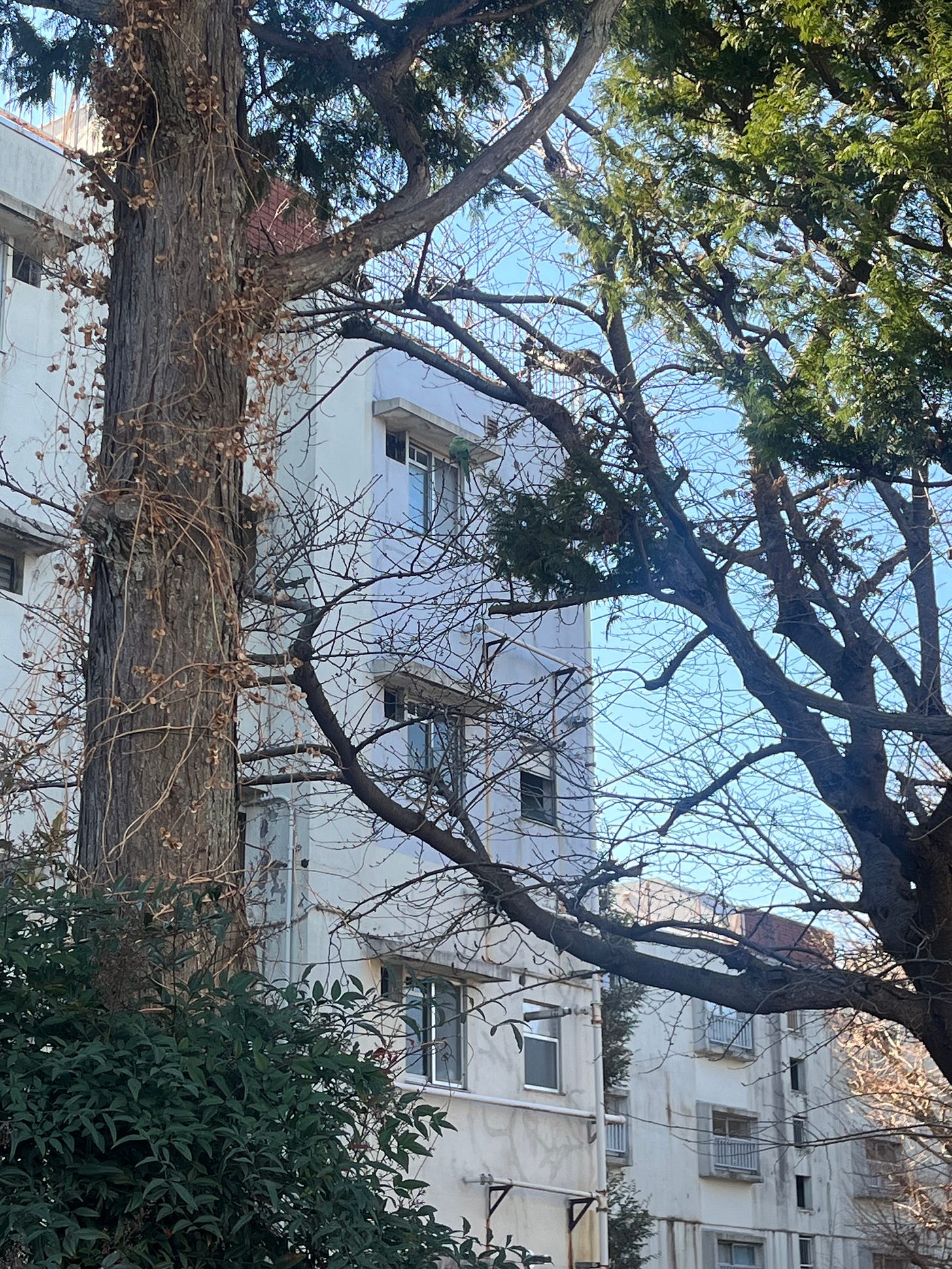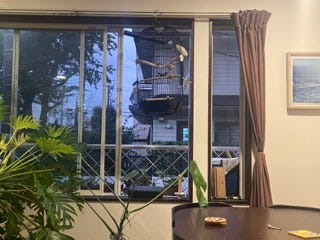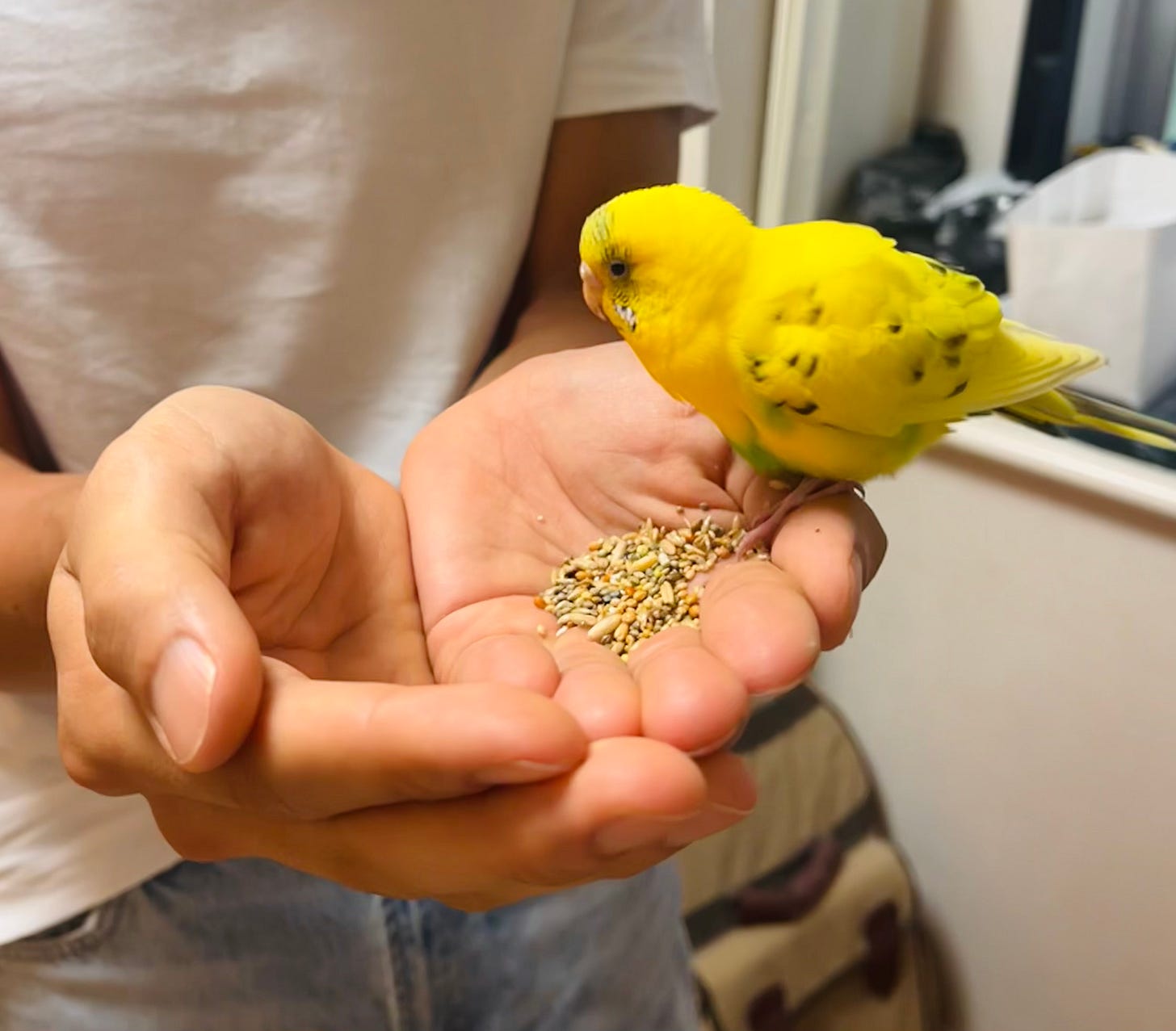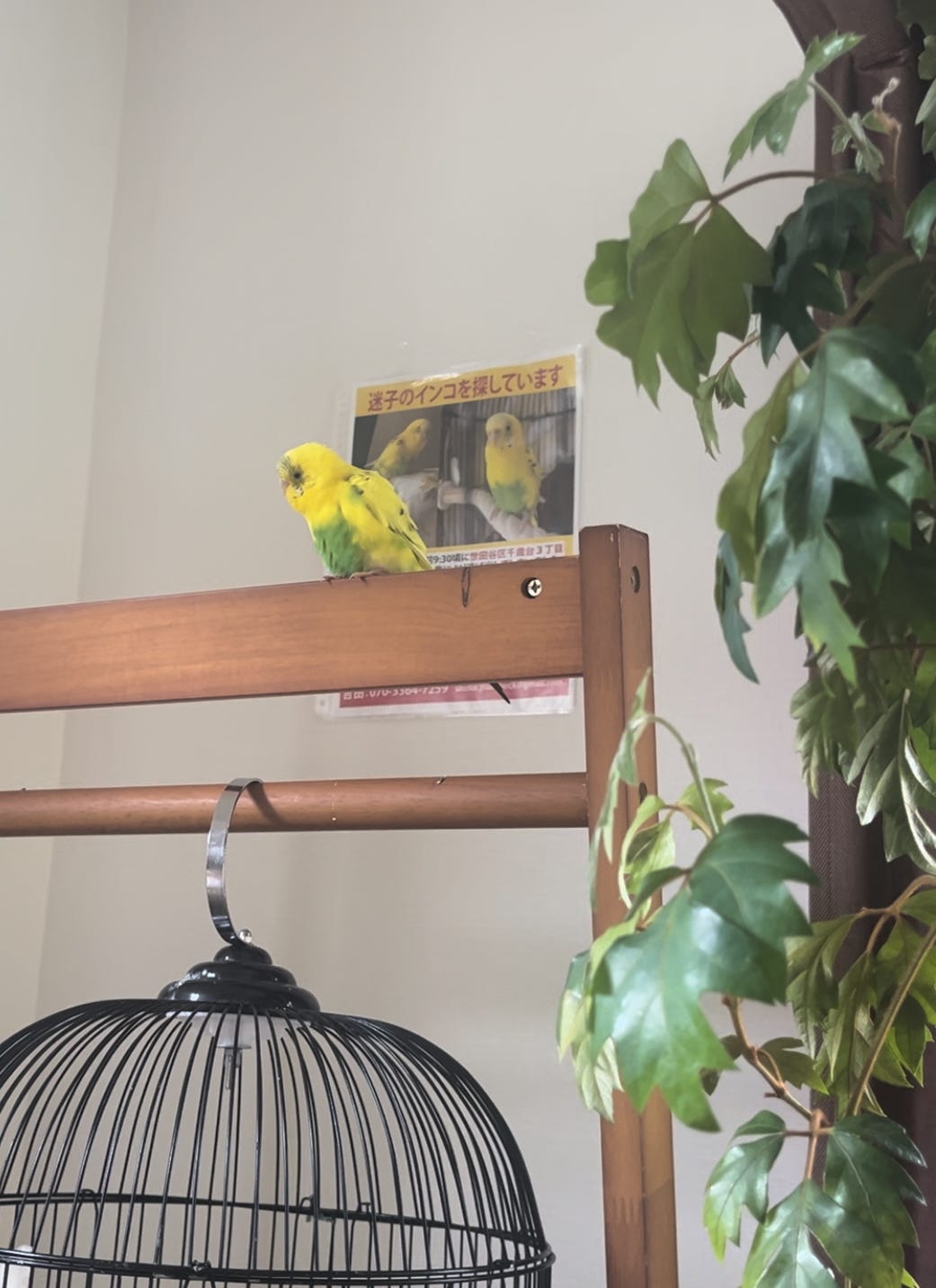Kyoko Flies Into A Typhoon: Part II
Did my bird survive a night in the storm? Will she make it back home? Welcome to part 2 of 2 in the saga of my missing bird
Where we left off in Part I of the saga of my missing bird:
After a full day of searching, Kyoko was nowhere to be found. Then, just as I was walking home from the sento around midnight…a typhoon hit Tokyo. Will my budgie survive the stormy night? Will she ever make it back home? Welcome to Part II—the final post in my search for Kyoko.
August 16th
1:00 ~ 6:00 am
I woke up repeatedly throughout the night to branches banging wildly against my bedroom window. The rain was blowing sideways, crashing against the house in uneven bursts. Each time I awoke, I wondered where Kyoko could be hiding. Images of the yellow bird tucked behind an AC unit or sheltered under a roof floated through my mind as I drifted back to sleep.
8:00 am
By morning, the storm had dwindled to a gray drizzle. The typhoon had completely zapped the heat out of Tokyo—like a hot pan shocked cold under the faucet. Part of me felt like I would walk into the living room and Kyoko would be there and I could open her door to let her out like I always do. But instead, I hung the empty cage in the window. I turned on bird noises. I biked around the neighborhood to look for her again.
About five minutes from our apartment, there’s a cluster of government housing that looks straight out of the soviet union. The grass has never been mowed and the trees are magnificent. A couple months ago, I had discovered a colony of green parrots living in the area — at least four of them. I’d see them in the same tree every time I walked by, always chatting busily amongst themselves. I wondered if maybe Kyoko had found them and attempted to make friends. I pulled up my bike and watched the tree for awhile, but even the parrots were still after the storm.

Not really knowing what else to do, I went home and asked Ibuki if anyone had called — no luck.
I heard phantom chirps all day. I kept checking my phone for calls. By now, Kyoko could have been eaten by a cat, picked off by a raven, hit by a car, died from exposure, or — best case scenario — taken in by a stranger and found a new home.
Until I was five, my best friend was a handsome siamese cat named Milo. I loved this cat so much that my first word wasn’t “Mom” or “Dad,” but “Milo” (to add insult to injury, I believe my second word was “banana”). One evening, I called out to Milo to come back in, but he didn’t come running like he always did. I called out all night, then searched everywhere the next day and every day after that, until we moved three months later.
That was a quarter of a century ago. And yet, in moments when I least expect it—cutting carrots, riding the train, running on the treadmill— my imagination conjures a new, often absurd fate for Milo. In the absence of answers or any way to get them, my mind writes me a thousand little stories that arrive like letters long lost in the post.
August 17th
9:50 AM
I lay on the carpet, staring at the ceiling while bird sounds played through the speakers. Ibuki had to step over me a couple of times on his way from his desk to the kitchen. It may have looked pathetic, but this was the necessary first step in my acceptance process—one I’d decided to begin earlier that morning. I still hoped for the best, but the crucial first two days had passed. Kyoko was most likely not coming back.
Ibuki stepped over me again to go to the bathroom. A few minutes later, behind the closed door, I heard him speaking formally on the phone. My ears perked up. I rocked myself upright to listen.
He came out and approached me like someone trying not to spook a horse.
“So, the police called. Someone found a bird matching her description—and they live nearby. We can bike there. They said not to get our hopes up, though, because it might not be Kyoko.”
I had already grabbed Kyoko’s carrier and bird food. I was in the mudroom putting on my shoes before he’d finished explaining the situation.
“Like I said, don’t get your hopes up!”
Ibuki added that the police had described the bird as “attached to people and well-behaved.” This made me pause while putting on my second shoe. I couldn’t help but feel my heart sink a little.
“That doesn’t sound like her at all,” I said.
Ibuki nodded.
As promised, the police sent over the name and address of the person who had reported the missing bird. It was a woman, and coincidentally, her name could be read as “Shoko.” The first kanji in our names were different—hers was 祥, meaning auspicious, while mine, 翔, means flying. Her kanji could also be read as good omen, and in that moment, it felt like as good an omen as any.
10:15 am
Ibuki and I biked across a giant intersection that Kyoko would have had to fly over to get to the lady’s apartment. After that, we turned into a maze-like residential area with narrow streets that were barely wide enough for a single car. In about fifteen minutes, we arrived. The apartment complex was a gigantic concrete structure with layers of security and a receptionist. Once in, we wandered through pleasant tree-lined paths to arrive at the apartment number we were given.
A middle-aged lady in a t-shirt dress answered the door — she had a bob the same length as mine. Her husband and a police officer from the phone call stood behind her.
“Hi, my name is Sachiko,” she said.
Ibuki and I glanced at each other. The other reading. We introduced ourselves and Sachiko-san gestured for us to come in.
“We gave the bird lettuce and bits of bread. I’m not sure if she ate it.”
The apartment had Nitori mats and the faint scent of a generic cleaner found in almost every Japanese household. The space felt familiar in that way, but being there also felt abrupt—like one moment I was sitting at home, and the next, I’d been plucked up like the little yellow guy in Google Street View and dropped onto a random spot on the map. Here I was, in this nondescript neighborhood in a generic apartment with an unfamiliar lady — and she was opening a door for me to enter a very tiny study.
She pointed to a bright yellow bird perched on a book shelf. I could not believe it.
I squinted at the bird and tried to recall Kyoko’s exact markings. I didn’t want to be mistaken just because I wanted it to be her.
The bird and I looked at each other intently. Then she leaned forward and flew onto my shoulder and began chirping excitedly into my ear.
My skepticism fell away like a sheet of ice and melted into relief. I had to turn away from everyone so they couldn’t see me tear up.
As soon as I put bird seed into Ibuki’s hands, Kyoko dived in like she quite literally had not eaten in three days. She was unhurt, but weak and very tired — I could see now how she could come across as calm and well-behaved.
Kyoko surrendered herself to the carrier without protest—also uncharacteristic—and we brought her into the living room, where everyone was waiting. The mood was light; people were laughing. Sachiko-san told us how Kyoko had taken a liking to the policeman and perched on his shoulder the entire time he was taking her statement. That didn’t surprise me—for whatever reason, Kyoko loves tall men. The taller, the better.
“He’s her type,” I explained.
The policeman laughed shyly, clearly pleased.
On the other hand, the shorter someone is, the meaner she is to them. Kyoko seems especially wary of women, so I wondered how she ended up with Sachiko-san. I asked her to tell me the story.
“Well, I was taking out the trash this morning,” she began, “and Kyoko-chan flew out of nowhere and landed on my shoulder. I was so surprised! Animals don’t usually like me. I brushed her away a couple of times, but she kept coming back. And I’ll be honest with you,” she laughed, “I was hoping she’d just fly away so I could pretend I never saw her. But she wouldn’t leave me alone. I didn’t know what else to do, so I just brought her home.”
I couldn’t help but notice that not only did Sachiko-san have the same hair as me, but she also had a similarly round face and wide-set eyes. She was just slightly shorter. Maybe—just maybe—she looked enough like me for Kyoko to see her as a familiar presence in a strange new world. Someone who might feed her, at the very least.
11:15 am
I carried Kyoko home in the basket of my bike. The sky was bright blue again and the cicadas triumphantly sang summer, summer, summer. It felt like I had dreamt up the typhoon.
As soon as we got back to our apartment, Kyoko made a beeline for her cage — I could sense the weight of her relief. She shuffled onto her favorite perch, fluffed herself up, tucked one leg and promptly fell asleep.
I left her in peace and went to the kitchen. I wondered what she had been up to these past three days. How had she crossed that terrifying road? Who (or what) did she encounter? Did she have any close calls? Where was she the night of the typhoon? Was she scared? Did she have any fun? How high did she dare to fly? If given the chance, would she do it again?
I wished I had a hidden camera that had captured her entire adventure. I would have given anything to see it — to know what she experienced. But my most important wish had already come true; she made it back home safely.
I filled up a pot with water and put it on the stove. It was time to make her a hard-boiled egg, just like I’d promised.
End Note
Later that evening, I went around town to collect the missing bird posters and thank everyone who helped me. I got to tell Nagai-san — the man working at the convenience store across from the shrine — the good news. He basically screamed yokatta ne-! (I’m so glad!).
When I got home I put up Kyoko’s missing bird poster behind her cage. Seeing her perch in front of it made me laugh for months.
So petulant and tough and lucky — I cannot believe her.





Amazing result of your search. Thank you!
This is the ending we needed! :)